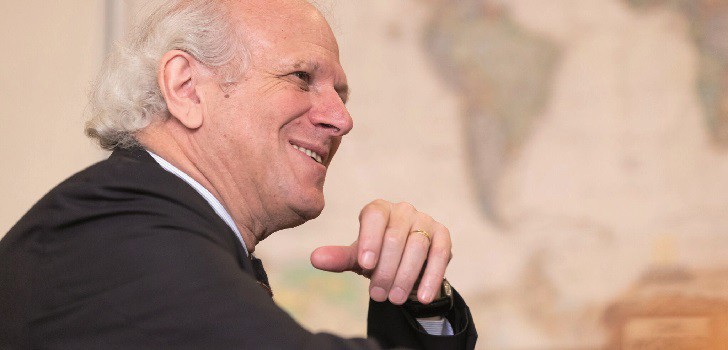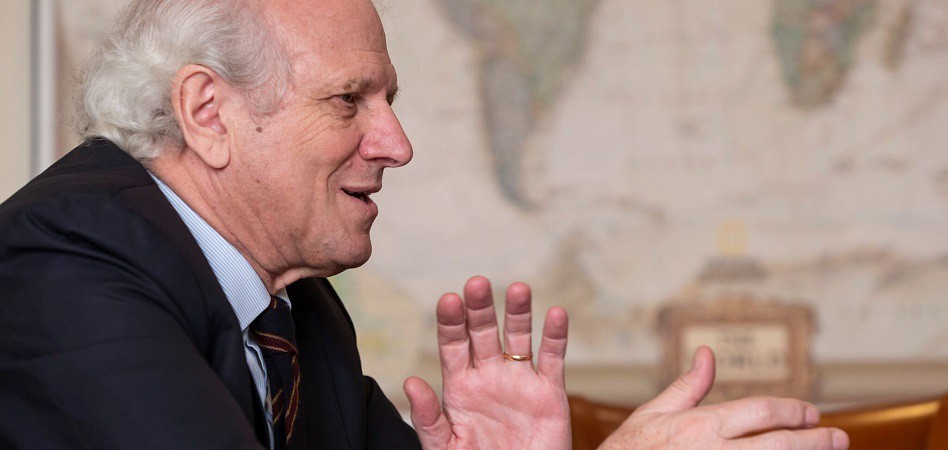C. Malamud (Elcano): “Latin America must exit the middle-income ‘trap’ in order to become a greater consumer market”
The leading researcher of Spanish think tank Real Instituto Elcano explains the political, economic and trade situation Latin America is going through.

In the headquarters of think tank Real Instituto Elcano, in Madrid, Carlos Malmud, has an extensive trajectory analysing one of the most troubled regions in the world: Latin America. Professor and political expert, the Argentinian works as lead investigator in the international and strategical studies entity from a Spanish, European and global perspective. Malamud is author of a wide variety of publications about Latin America, from the colonial era to the present, investigating each market in depth to understand the difficulties the region is going through and how Spanish economy is placed in comparison with the American continent.
Question: Trump in the United States, the Brexit in the United Kingdom… The world seems more unstable.
Answer: I don’t know if more instable, but more complex and difficult to foresee. And that is not only due to politics, but is also linked to technological changes that are going on, like the digital revolution or artificial intelligence, which affect as well in the way of doing politics. The elections are not the same anymore since social networks took such a leading role and changed the things in a worrying way. Today they talk about a new liberal movement, that is to say, that neoliberal democracies are put under question. What has been going on in Latin America for the last seven years is a decreasing, but constant, trend in terms of disaffection with democracy. People are increasingly upset with democracy and this is a phenomenon extensible to other regions in the world, where we can also observe the emergence of the angry vote, in which there is no satisfaction with traditional politics or parties, which boosted the role of outsiders.
Q: Populism or protectionism are global risks?
A: The technological change that brings digital revolution makes us to forecast a setting where inequalities are going to be much sharper than the present ones. Those countries that miss the boat of transformation will have more difficulties to integrate in the future. The current paradox is that on one hand we see the emergence of global risk and threats that is facing a local speech. In case of the European xenophobic populism, the last thing one expected ten or fifteen years ago was that all these micro movements converged in one to be presented at once in the European elections.
“Those countries that lose the boat of transformation will have more difficulties to integrate in the future”
Q: Are we going to face shorter economic cycles?
A: The volatility of markets, the appearance of black swans and all this kind of questions are commonplace. So, the possibility of a growing period comes followed by a recession or crisis period is more latent than some years ago or the last decade.
Q: Is Latin America a more attractive market for international companies?
A: The region has a very important growing power and can get more prominence in the following years. To make that occur, a series of conditions have to meet: if Latin Americans, both leaders and the people, do not make an effort to take their countries on the ground, even if the region is attractive it is not going to develop. However, under the table there is the interest powers have, for example China, which is every time more present in Latin America because it thinks the opportunities for business and companies are profitable in the region.
Q: What are the advantages and disadvantages of Latin America?
A: The region has one of the largest populations in the world, which for sectors like fashion is a very important aspect. Moreover, Latin America still is a producer of natural resources, especially mineral, fuel and food and agriculture products. In the third place, there are some countries that are being more respectful with the laws of the market, with a more solid legal certainty. On the contrary, the world sees Latin America as a troubled, unsafe region, where the corruption operates freely. It is true that it is the most unequal market in the world and also the most dangerous, and that is a handicap for the growth in the region. Latin American societies have to start taking responsibility for this problematics, now it seems that they are demanding answers in matters of corruption. Another drawback is the backwardness in education, development, science and technology.

Q: Is it now a safer market than ten years ago for economic activities?
A: It depends on the country. Venezuela is in an extreme where there are very few international companies left operating in the country and most of the ones remaining maintain their operations because leaving is more expensive than staying. On the other side of the balance, there are economies like the Colombian or the Peruvian, which are making great efforts in matter of legal certainty and with better market conditions. In that sense, the most remarkable example is that of Chile, which opened its market to the world and offers, in general lines, enough guarantees for foreign investments to bet on the country.
Q: Taking into account the demographic structure of Latin America, how can it be affected by immigration?
A: The Latin American population is mostly urban and relatively young and, although in recent years there has been an aging in countries such as Uruguay, Argentina or Cuba, they are not alarming signs like those in Europe. In addition, everything indicates that in the next thirty years Brazil and Mexico will be among the most populated countries in the world. There have always been internal migrations between border countries, linked to the demand of labour forces, which until now have not been conflicting. But now we are facing a different scenario, taking the case of the Venezuelan exodus, spreading throughout South America and also in the United States and Spain. Now, with the crisis in Nicaragua, there is also a wave of migrations to Costa Rica, mainly. In Latin America there are emerging cases of xenophobia that were not recurrent and this is already having significant political repercussions.
“The North American imperialism and the European Union are being pointed out as those that want to take the resources of the region”
Q: What role does politics play in the economy of the region?
A: It is just as important as in Europe, in general there are no major differences in the implications on politics for the governability of countries, be they Latin American or European. There is a very recurrent discourse in Latin America about the responsibility of the people, linked to the failure of regional integration, which is summarized in the idea that if Latin America has not been integrated it is because they do not permit it. North American imperialism and the European Union are being pointed out as those who want to keep the resources of the region. But in reality, if Latin Americans did not integrate, it is because they didn’t want to or weren’t able to. One of the great obstacles in this integration is the excess of nationalism that exists in the region, which has systematically impeded the transfer of sovereignty to supranational instances in which it is impossible to advance in an integration process.
Q: Can Latin America be a consumer market as important as the United States or Europe?
A: It could, but that would entail making great transformations and one of the challenges would be going out of the middle-income trap. All Latin American countries of medium income, but the question is to move from the average to the high income. Once these countries can get out of the trap that is pigeonholing them, they will attract greater consumer markets.
Q: What else is needed to make it so?
A: A clear commitment to education, especially in research, development and innovation. In addition to a series of institutional reforms that would allow greater independence of the judiciary and lead to greater respect for contracts and institutions and reduce protectionism. All this accompanied by greater empowerment of citizens.

Q: Is the deficiency of trade agreements another of the obstacles for the development of the region?
A: The failure of integration has nothing to do with the lack of commercial agreements. In fact, most Latin American countries have free trade agreements with each other, although the volume of international trade, which is around 16%, is among the lowest in the world. Integration is one thing and Latin American economies opening to the world is another one.
Q: From a strategic point of view, what role should Spain play in Latin America?
A: There is a large number of Spanish companies in the region and not only those of the Ibex35. In Mexico there are almost 6,000 Spanish companies, at the beginning there was greater investment of service companies, but now it is expanding to productive sectors or where the productive component is much larger. But just as Spain is an important player from the point of view of investment, its role as commercial partner of these countries is minor. The foreign trade of Spain with Portugal is superior to that of all Latin American countries. The economies of the region do not need Spain to interact with other European countries, but it is true that Spain is a privileged partner. The Government must enhance that role to make better use of its presence in Latin America.
Q: For an international company, is it wrong to think of Latin America as a common market?
A: Totally. In the nineties, they talked about Spanish investment in Latin America, but now they know that one thing is to be in Mexico and quite another, in Brazil. They have quite learned to attack the region, with successes and failures.
“But just as Spain is an important player from the point of view of investment, its role as commercial partner of these countries is minor”
Q: What would be a good strategy to face the Latin American market?
A: Know where you want to go and be clear about why and how. Not all countries are the same, you have to know how to choose the local partner, assess the risks and the cost of doing business in a certain country. You cannot go with general recipes to Latin America. Each company, even within the same sector, has a more ideal market than another.
Q: In the fashion sector we see a very low internationalization of Latin American companies. Why?
A: Because the incentives are not the same. This has to do with what the State offers to its companies and what possibilities there are if it becomes internationalized. Small Spanish companies took a leap to the region after the crisis slapped the sector and had no alternative but to go outside. And this has not only happened in the fashion sector, but has been seen in other industries and service companies, such as tourism, restaurant or banking.
“Leaders of European elites will have to think about what role they want to play in this new world order in the future”
Q: Who is going to star in politics for the next ten years?
A: If all the previsions are met, the weight of the Pacific over the Atlantic will be increasing. This entails that the centre of international activity will be in the Pacific basin, which can make Europe much more irrelevant than how it was until now. But this will be the case as the variables do not change and the growth of the Asian continent, especially China, is affected by some factor in particular. Leaders of European elites will have to think about what role they want to play in this new world order in the future. Figures like those of Donald Trump do nothing but accelerate the decline of Europe with a United States that is much more isolated from its traditional partners and disconnected from democratic values.
Q: What is the picture after the intense 2018 in electoral matters?
A: In 2019 there will be six more presidential elections, like those of Argentina, Bolivia and Uruguay. The scene will also be intense, with a changing map of internal political balances. Now we face a contradictory balance, with a turn to the right that has not finished consummating. Obviously Bolsonaro's triumph implies important changes for all Latin America and calls into question that there is a contagion effect for the entire region. On the other hand, there was a triumph of the centre-left in Costa Rica, in addition to the reckless re-election of Nicolás Maduro. The regional panorama will continue to be complex and fragmentation is still present.


info@themds.com
Validation policy for comments:
MDS does not perform prior verification for the publication of comments. However, to prevent anonymous comments from affecting the rights of third parties without the ability to reply, all comments require a valid email address, which won’t be visible or shared.
Enter your name and email address to be able to comment on this news: once you click on the link you will find within your verification email, your comment will be published.